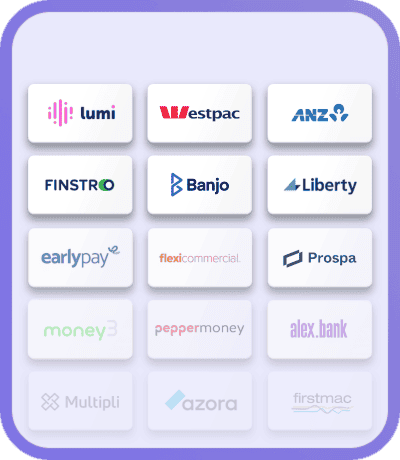Best Small Business Loans in Australia
We’ll help you get the right finance for your business. It’s free to compare, with no credit score impact.
$

$1bn+
Processed loans
2000+
Users
70+
Lenders & growing
12k
Deals monthly
How Lend helps small businesses get finance
Access 70+ lenders
Access small business loans from major lenders as well as dozens of specialist providers.

What you can get with a small business loan through Lend
- Choose your best option from our panel of lenders
- Fully online application
- Finance amounts up to $5,000,000+
- Flexible finance terms to what you need
- Secured, unsecured and non-traditional finance options
- Funding in as little as 24 hours
- No-deposit and balloon payment options
- Repay your loan early and save on interest
Business loan interest rates in Australia
Business loan rates typically range from 10-25% per annum (p.a.), depending on the type of finance you choose and your business profile. Lenders’ interest rates are calculated largely based on risk. The lower the risk for the lender when you apply for your business loan, the lower your rate.
Lenders use the three Cs to set your loan rates and terms.
Character: This includes your credit rating, business history and experience. Think of it as your business resume.
Capital: Your business revenue, assets and liabilities.
Collateral: The cheapest interest rates are generally on secured business loans where an asset — usually property — is used as collateral. Unsecured business loans have higher interest rates to reflect the risk to the lender.
Check out how interest rates will impact your loan repayments and overall cost using our business loan calculator. On fixed term business finance, you’ll typically make fixed repayments on an agreed schedule (e.g. monthly or fortnightly) including interest, or the repayments may be interest-only for a period.
With other types of financing, such as business overdrafts and business credit cards, the amount of interest charged and your minimum repayment amount will depend on how much you have borrowed, and is generally calculated on your debit balance, then charged at the end of the repayment period.
Compare business loan rates
Type of Loan | Interest rates starting from |
|---|---|
Business overdraft/line of credit | 10-15% p.a. |
Secured business loan | 10-15% p.a. |
Unsecured business loan | 15-20% p.a. |
Hire purchase/equipment finance | 7-15% p.a. |
Finance lease | 6-15% p.a. |
Invoice factoring | 3-5% of the invoice value |
Merchant cash advance | 10-20% of daily card sales |
What impacts business loan interest rates?
Security
If you have property or other assets to offer as collateral, you can expect to pay lower interest rates because there's less risk for the lender (they can repossess the asset if you default). Unsecured loans are generally more expensive. The type and age of asset being used as security matters too.
Trading history & revenue
Lenders tend to offer lower interest rates to established businesses with a solid record of profitable trading. That’s because they can reasonably expect to get their money back with interest on the agreed schedule.
Type of lender
Big banks often have business rates that look really enticing. But the reality is many businesses will not qualify for those rates. On the flip side, the rates offered by smaller more specialist lenders sometimes look less competitive but are far more achievable for most businesses. If you need to work with a bad credit lender, expect to pay a rate premium.
Loan amount & term
The duration of your loan and how much you’re borrowing can also impact the rate you get. Short-term business loans often have a high rate versus medium- and long-term finance. Depending on the lender, you might also pay a rate premium if you’re borrowing a large amount and the lender feels that adds to the credit risk.
Understand your small business loan options
A secured business loan is a longer-term borrowing facility, with a personal or business assets (usually property) required as collateral. Secured business loans often offer lower interest rates compared to unsecured loans.
Secured business loans are generally used for lender-term business goals such as financing vehicles or equipment, fit-outs, or even getting finance to buy out a competitor.
Pros
- The loan term is usually tied to the life of the asset and you can set a repayment schedule to match the cashflow of your busines
- Often come with lower rates and more flexible terms than unsecured loans
Cons
- Loans secured by non-residential assets attract higher interest rates
- Usually a longer application process
An unsecured business loan is short-term finance without security, typically used to cover immediate business requirements. Unsecured business loans typically have higher interest rates because the finance isn’t backed by a physical asset or something of value, meaning the lender is taking on more risk.
You can use an unsecured business loan for any business activity, including to boost working capital or invest in inventory, equipment, renovations, hiring new staff, etc.
Pros
- Generally faster to apply for and get approved as the requirements are simpler
- No fixed asset or collateral needed as security for the loan
- Can be used for more or less any legitimate business purpose, from purchasing inventory to financing the purchase of an existing business
Cons
- Interest rates and fees are higher due to the increased risk to the lender
- Smaller loan amounts and shorter loan terms
A business line of credit (aka an overdraft) gives small businesses access to an agreed amount of capital that you can access anytime you need. Your borrowing capacity for a line of credit will depend on your credit score and accounts receivable. You will only pay interest on the drawn down amount, plus a line fee to maintain ongoing access to the credit.
A business line of credit can help small businesses manage cashflow shortages, but are generally less suitable for long-term investments or major purchases.
Pros
- Extremely flexible – draw and repay funds as you need them and repay regularly or with lump sums without any penalties
- You only pay interest on the amount you borrow, not the total amount available
Cons
- Higher interest rates than standard business loans
- Shorter repayment terms and you may be required to pay off the overdraft at specified intervals
Invoice finance or ‘factoring’ is a form of trade finance. It allows you to borrow against your outstanding invoices in exchange for a cash advance. It’s basically ‘selling’ your payable invoices to a lender to secure funding. The lender will forward you up to 80% of the value of the invoiced amount. You can either retain control over collecting the payment from your client or pass that responsibility to the lender.
Invoice finance can also be suitable for businesses that may struggle to access other types of financing, such as startups.
Pros
- Immediate injection of cash – no need to wait for payment of invoices
- Allows your business to offer flexible payment terms to new customers
Cons
- You receive less for each invoice by financing
- Usually more expensive than loan finance
A merchant cash advance is a form of cashflow finance. It's alternative financing model that provides you with a lump sum payment, which you repay using an agreed percentage of daily EFTPOS credit and debit card sales, plus fees charged by the lender. The total cost of a merchant cash advance will depend on your factor rate which is a decimal figure, not an annual percentage. You can convert your factor rate into an annual percentage rate (APR).
Pros
- Immediate cash injection – funds usually available within days
- Repayments directly linked to cashflow ( an agreed percentage of card sales)
Cons
- Only available to merchant businesses making daily debit or credit card sales (e.g. retailers, restaurants, etc.)
- Often considerably more expensive than other financing options
Equipment finance, also known as asset finance, is a fixed-term loan or lease used to purchase or lease equipment, plant or machinery for your business. The lender will either lend you the money to buy the asset or you may choose to rent the equipment from the lender. This works like a leasing agreement which means repayments are classified as a business operating expense and therefore tax deductible.
Pros
- Lower interest rates than unsecured business loans
- Longer loan terms (up to 7 years)
Cons
- Some equipment finance may require a deposit
- You may not own the equipment at the end of the contract (under a lease agreement)
A chattel mortgage works much like secured business car finance for vehicles or assets purchased for commercial purposes. You get ownership of the asset from the outset which is used as security for the loan until it’s paid off. Your business can claim the interest on chattel mortgage payments and tax depreciation if the asset is used to produce income. This is makes a chattel mortgage different from a hire purchase or finance lease whereby the lender buys the assets and leases them to your business in exchange for regular payments.
Pros
- Interest rates are usually lower than unsecured loans
- Flexible repayments structure in line with your cashflow
- Can be used for assets big and smalll - from coffee machines to finance for trucks
Cons
- A balloon or residual payment may be payable at the end of the term
- Early payment penalties may apply
Expert tips on finding the best small business finance option
With conditions for businesses continuing to be challenging in many industries in 2025, having access to funding is key. Lend’s Chief Operating Officer, Phil Druce, shares some tips on how to put your best foot forward when applying for business finance.
1. Consider non-bank lenders
Online lenders have more flexible lending criteria and faster application processes. That’s because they use technology to analyse your business profile, credit report and business bank transaction data (they’re also less regulated as banks). Specialist online lenders also offer plenty of loan options that don’t require collateral.
2. Speak to a business loan broker
Business loan brokers can give you tailored guidance and match you with the right loan, based on your situation and the needs of your business. They can also help with your loan application to save you time.
3. Match the finance to your business needs
For example, you can cover fluctuations or shortfalls in your working capital with a flexible, short-term business loan or business overdraft. If you’re making a big purchase or want to fund an expansion, you’ll need a long-term loan with a repayment schedule that matches your cashflow.
Check your eligibility for a small business loan
The Lend team will guide you on which lenders off the best chances of approval, but some of the common minimum eligibility requirements for small business loans to keep in mind are:
- Australian citizenship or permanent residency
- An active Australian Business Number (ABN) or Australian Company Number (ACN)
- At least six to 12 months of trading history
- Minimum $10,000 monthly revenue
- The ability to provide financials or bank statements
- A good business credit score — the minimum credit score for business lending is generally around 680.
How to apply for a small business loan
1
Prep your financial documents
Including bank statements; BAS statements, tax returns and cashflow projections.
2
Provide business information
Like its trading history and experience to prove viability and likely its future performance.
3
Submit proof of collateral
Such as property, land, vehicles or other assets to be recorded in the Personal Property Securities Register.
4
Show how the loan will be used
Show how do you plan to spend the funds and when you can start making repayments.
5
Get approved by the lender
Lenders will assess your application and either provide an instant response or seek further info.
6
Easily access your funds
If approved, you can sign the loan agreement electronically and get the funds within a few business days.
More FAQs on small business loans
All lenders have their own method of calculating interest payable on a business loan. The main types of interest rates include:
- Annual rate (simple interest): The annual interest charged on the principal amount. This rate does not include fees or charges.
- Annual percentage rate (APR): The yearly interest rate charged on the loan over the term, plus all compounding fees and charges.
- Factor rate: The factor rate is interest on the loan is expressed as a decimal figure.
Small business loans typically fall within two categories — secured and unsecured.
Secured business loan: Requires using an asset as collateral for the loan — usually property — although some lenders allow you to use equipment or other physical assets as a guarantee for the finance. Secured finance usually offers lower interest rates and fees since it poses less risk to the lender. The lender could reclaim the asset(s) secured against the debt to cover any losses.
Unsecured business loan: Doesn't require any collateral for the loan. Instead, the lender will look at your creditworthiness and the cashflow of your business to assess your serviceability. Unsecured business loans often come with higher interest rates and fees to reflect the additional risk to the lender. You also may not be able to borrow as much with an unsecured business loan.
How much you can borrow will depend on the size of your business, your borrowing capacity and the type of loan you apply for.
If you opt for an unsecured business loan, you could borrow between $10,000 and $500,000
You could be eligible to borrow up to $5million with a secured loan (with collateral).
The main difference between a small business loan from a bank and a specialist lender is the application process. The approval process is generally quicker with a specialist online lender. It depends on the type of loan you are applying for, but in most cases, the entire process from loan application to decision takes under an hour.
Specialist lenders are also typically more flexible in terms of which businesses they will lend to.
It depends on the type of loan you’re applying for. In most cases, the entire process from loan application to decision takes under an hour if you apply for unsecured finance with an online lender. Secured loans may take a few weeks depending on the guarantee/collateral, paperwork required, and credit approval process.
Lenders require bank statements to assess your financial situation and therefore the risk of lending their money to your business. They look at your business revenue, income stream(s), billing history and debt liabilities. They will also look for dishonours (missed payments).
No, you don’t need a deposit to get a term loan for your business. Some lenders may ask for a down payment for asset finance or if you’re buying an existing business. Please note a deposit is not the same as security (collateral) which is required for any secured business finance.
Yes, most lenders will allow you to pay out your loan early without penalty. However, there are some exceptions to this rule, so be sure to check the fine print with your lender. Some lenders will charge you break costs and this could undo any savings made on the loan.
Business loans to start a new business and for startups are more difficult to secure than standard business finance. It’s best to apply for finance for a new business with a non-bank lender with less stringent lending requirements. Banks don’t like to lend to businesses that aren’t established.
Yes, you may still be eligible for a business loan if you have bad credit. You can apply for a bad credit business loan which is similar to a standard unsecured loan, but comes with higher interest rates. You may initially be able to only borrow up to $50,000 until you build up your credit score. The minimum credit score for business lending is generally around 680.
Getting rejected for a business loan may be attributed to (but not limited to) any of the following reasons:
- Your business financials don’t reflect your ability to meet your repayment obligations
- You haven’t been in business long enough
- You have too many debt liabilities
- The outlook for your industry is not promising or your industry is too high risk
- Your business is seasonal
- The majority of your revenue comes from a handful of suppliers
- The business owner or director has bad credit.
70+Lenders to choose from






